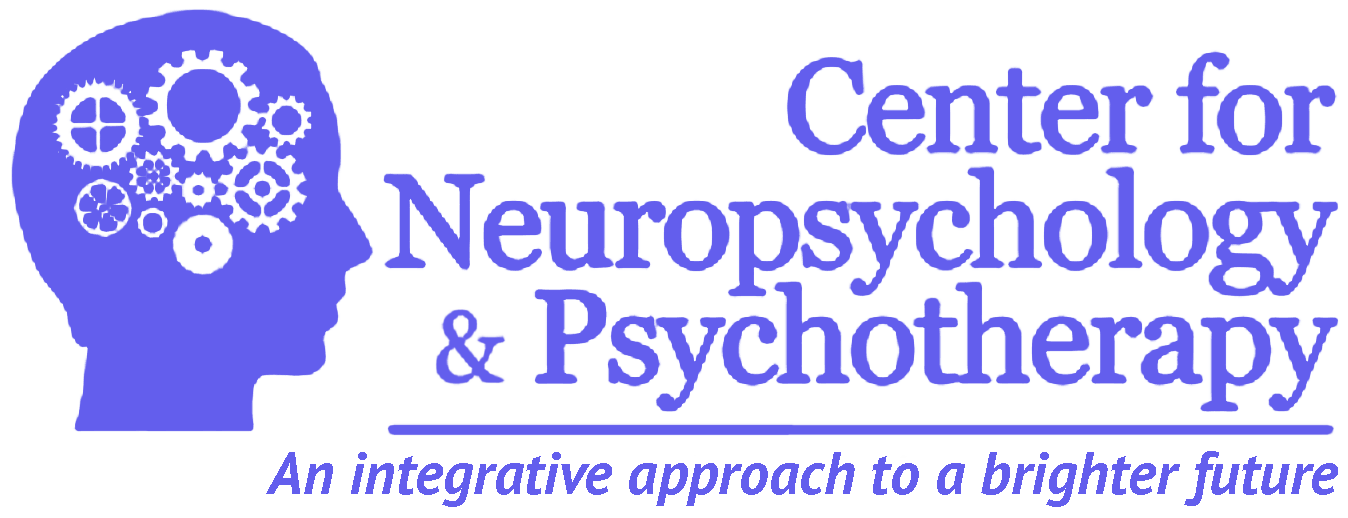
Evaluations: Neuropsychological and Psychoeducational
At our center, we offer comprehensive neuropsychological, educational, psycho-educational, and psychological evaluations from ages 6 through adulthood. Such evaluations can include intellectual, adaptive, academic, personality, emotional, and diagnostic (neuropsychological) measures to assess for (but not limited to) Autism Spectrum Disorders, Attention Deficit/Hyperactivity Disorder, Learning Disabilities, Gifted Students, as well as Medical & Neurological problems, such as: Traumatic Brain Injury, Concussions, Hydrocephalus, Seizure Disorders, and Brain Tumors. The reasons for seeking an evaluation may vary considerably, though many times, it’s recommended as a tool to aid in assessing cognitive strengths and weaknesses, clarify or provide a diagnosis, inform treatment planning and goals, or perhaps a second opinion. It is also important to note that a comprehensive evaluation is often a critical element when determining the need and eligibility for a 504/Individualized Education Plan (IEP).
Dr. Grafman has received the necessary training and experience that allows her to practice ethically and within the parameters of this specialty area in psychology. Below is a list of frequently asked questions regarding this type of evaluation and what one should expect.
What is a neuropsychologist?
A neuropsychologist is a licensed psychologist with extensive specialized training in neuroscience, neuroanatomy, and brain-behavior relationships. They have expertise in how learning and behavior are associated with the development of brain structures and systems. Like any other healthcare profession, if a psychologist wants to specialize in a particular subfield of psychology, they have to go on for further study and training. So, in addition to obtaining a doctorate in psychology (i.e., either a Ph.D. or Psy.D.), which typically takes 4-6 years, a neuropsychologist goes onto more advanced training at the fellowship level; which is an additional two years of training. Fellowships in neuropsychology range across the developmental lifespan; so whereas some neuropsychologists specialize in pediatrics only, others may have had training in both adult and pediatric. Nevertheless, a two-year fellowship is the respected minimum requirement.
What is a Pediatric Neuropsychologist?
Pediatric neuropsychology is a specialty within the field of neuropsychology. It emphasizes the study and understanding of brain-behavior relationships in children (of all ages) with known or suspected neurodevelopmental issues, including epilepsy, acquired/traumatic brain injury, Attention Deficit/Hyperactivity Disorder, Autism Spectrum Disorders, learning disabilities, brain injury, brain tumors, as well as co-morbid emotional and behavioral disorders (to name a few).
What makes pediatric neuropsychologists unique is that they are trained and qualified to administer and interpret standardized tests that assess brain functions (i.e., intelligence, memory, language, attention/concentration, etc.). The neuropsychologist may work in many different settings and, in addition to providing evaluation services, may have different roles in the care of your child. In some cases, the pediatric neuropsychologist is a case manger who follows the child over time to adjust the recommendations to the child’s changing needs. He or she may also provide treatment, such as cognitive rehabilitation or psychotherapy.
Whether it be in an inpatient hospital setting or in an outpatient private practice, neuropsychological testing is extremely helpful in better understanding pre-existing or newly onset cognitive, learning, social, and/or behavioral problems. The results from testing are often a crucial component in developing a treatment plan or educational intervention strategies for your child. In an effort to provide the most comprehensive services, a child or pediatric neuropsychologist typically consults with schools, as well as works with other pediatric specialists in behavioral neurology, developmental pediatrics, pediatric neurology, child psychiatry, pediatricians, occupational therapists and speech and language therapists.
What is a neuropsychological evaluation?
A neuropsychological evaluation is a comprehensive assessment of cognitive and behavioral functions using a set of standardized tests and procedures. Testing involves paper and pencil and hands-on activities, answering questions, and sometimes using a computer. There are no invasive procedures, no pain, and no needles. In addition to standardized testing, a detailed clinical interview and developmental history is conducted with the parents/caregiver’s. Parents are also usually asked to fill out questionnaires about their child’s development and behavior. Furthermore, in most cases, information is also obtained from teachers and other professionals who work with the child. The neuropsychologist may also wish to observe your child in a less controlled environment (i.e., testing), such as in a school setting. The evaluation can take approximately 6-8 hours of face-to-face contact and can be scheduled in one or several appointments, all of which depend on the child.
Once this process is completed, the practitioner will devise a report. Although reports vary among practitioner, they typically include historical information obtained during the clinical interview, behavioral observations made during the evaluation, as well as a detailed explanation of the various mental functions assessed and subsequent results from testing. The report will typically highlight the child’s strengths and weaknesses. Clinical impressions are also made, sometimes providing a definitive diagnosis, while other times deferring (i.e., when a diagnosis cannot be made for some given reason). Recommendations are also provided. Most reports are heavily loaded with a lot of “neuropsych” jargon. In an effort to clarify, feedback to the parents/caregivers are a crucial part of the process. It is an opportunity for all parties to discuss results and come up with a game plan for your child.
Regarding standardized testing, a typical neuropsychological evaluation will include the assessment of various mental functions, such as but not limited to:
-
- General intellect
- Achievement skills, such as reading and math
- Executive skills, such as planning, organization, mental flexibility
- Attention
- Learning and memory
- Language
- Visual-spatial skills
- Motor coordination
- Behavioral and emotional functioning
- Social skills
Depending on the child’s needs, some areas may be measured in more detail than others. That is, a neuropsychological evaluation is not a fixed series of tests, which anyone can give. Specialized training allows the professional to select, administer, and interpret the particular battery of tests that will yield the most comprehensive understanding of the individual’s strengths and weaknesses.
How does a neuropsychological evaluation differ from a school psychological assessment?
School assessments are typically performed by a school psychologist to determine whether a child qualifies for special education services. Although the same can be done by a neuropsychologist, the school evaluation is limited to tests, which focus on achievement and skills needed for academic success. Generally, they are not equipped to diagnose learning or behavior disorders, as do neuropsychologists. For example, your school psychologist may suggest that your child has attentional weaknesses that interfere with school functioning and thus, make subsequent recommendations. But they would not be the professional to formally diagnose your child with Attention Deficit Hyperactivity Disorder (ADHD), as would a neuropsychologist. This is the same for all developmental disabilities. In most cases, a school psychologist may refer out for testing because they feel the child may be exhibiting more complex learning, social, and/or behavioral difficulties that go beyond the scope of their training.
When is a neuropsychological evaluation needed?
Children (and adults) are referred by a doctor, teacher, school psychologist, or other professionals because of one or more pre-existing or suspected problems, such as:
-
- Neurological conditions such as hydrocephalus, Autism/Asperger’s Disorder, meningitis, brain tumors, genetic disorders, Cerebral Palsy, ADHD, Downs Syndrome, learning disorders and epilepsy.
- Brain injury that occurs as a result of a motor vehicle accident, sports injury (concussion), stroke, or infection.
- Exposure to toxins such as lead, mercury, inhalants, cancer treatment with radiation or chemotherapy, exposure to alcohol in utero, and substance abuse.
- Vague cognitive, learning, behavioral, social, or emotional difficulties that have yet to be figured out.
What will the results tell me & how will it help?
Comparing your child’s test scores to scores of children of similar ages, the neuropsychologist can create a profile of your child’s strengths and weaknesses; the results of which help those involved with your child’s care. For example:
-
- Testing may help explain why your child is having school problems. Let’s say your child appears to be having trouble reading. Through testing, a neuropsychologist will be able to discern whether or not reading difficulties are due to an attention problem, a language disorder, an auditory processing problem, or reading disability.
- Testing will also help the neuropsychologist tailor interventions based upon how your child thinks, learns, and processes information. If such strategies are (then) implemented at home and school, your child may have a better chance of performing to their potential.
- Testing can also detect the effects of developmental, neurological, and medical problems, such as epilepsy, autism, attention deficit hyperactivity disorder (ADHD), dyslexia, or a genetic disorder.
- Testing may confirm or clarify a diagnosis
- Provide a profile of strengths and weaknesses to guide treatment and educational planning
- Serve as a baseline and document changes in functioning over time
- Testing can result in referrals to other specialists depending on your child’s needs (i.e., cognitive remediation therapist, neurologist, psychologists, psychiatrists, vocational counselors, etc.).
In sum, a neuropsychological evaluation can be very useful for many different reasons. However, like anything else, be an informed consumer and do your research by asking questions or obtain information from reliable resources, such as calling state and national psychological organizations or research them on the internet.
